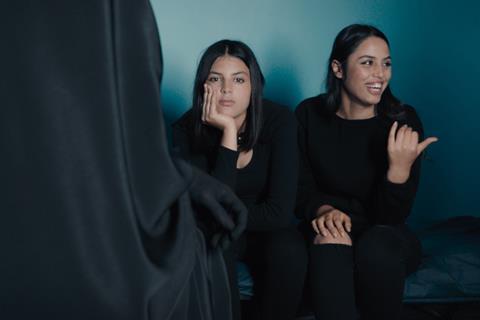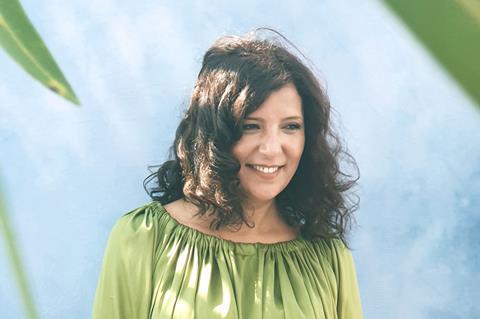Oscar-nominated for best documentary feature, Kaouther Ben Hania’s Four Daughters is based on a “spectacular and shocking” case of two missing girls. The Tunisian filmmaker talks about taking inspiration from fiction for her latest true-life story.

In 2016, Tunisian director Kaouther Ben Hania saw a television interview in which a woman called Olfa Hamrouni, a Tunisian mother of four daughters, talked about the circumstances in which her two eldest, Rahma and Ghofrane, left both her family and the country under tragic circumstances.
“I discovered this story on the news, and journalists focused on this spectacular and shocking aspect of it,” says Ben Hania, who studied filmmaking in Tunis and in Paris. “But I believed that if I wanted to truly understand, that shocking element was only the visible part of the iceberg — only a pretext.”
She contacted Olfa immediately and began making feature documentary Four Daughters, but something wasn’t clicking. “What I had in mind was a sort of ‘conventional’ documentary, and I began shooting that way. But it didn’t give a good sense of the complexity of this story.”
Ben Hania then stopped work on the film and turned her attention towards The Man Who Sold His Skin, a drama starring Yahya Mahayni and Monica Bellucci, which premiered at Venice Film Festival and was nominated for best international feature at the 2021 Oscars. “I try to alternate between fiction and documentary films, because fiction films are more expensive and take longer to finance,” explains Ben Hania, whose early work comprised documentaries Imams Go To School (2010) and Zaineb Hates The Snow (2016) and debut fiction feature The Challat Of Tunis (2014). “Financing is always extremely complicated because my films are in Arabic — they involve a lot of countries in co-production, each with their own constraints.”

Ben Hania credits The Man Who Sold His Skin with unlocking the way forward for Four Daughters, which would eventually premiere at Cannes — winning the L’Oeil d’Or for best documentary — before being released in the US last October by Kino Lorber, and going on to earn a best documentary feature nomination at the US Academy Awards.
“I returned to the project with fresher ideas and went back to my initial desire, which was to make this film in order to understand why — why this story, why this tragedy,” says Ben Hania, who keeps the exact nature of the two girls’ disappearance hidden from audiences until near the end of the film.
To better understand the family, she needed to explore their past, for which she had no footage. So Ben Hania decided to use actors to re-enact certain events, with Nour Karoui and Ichraq Matar playing Olfa’s eldest daughters Rahma and Ghofrane, and Majd Mastoura playing every man discussed by Olfa and her two younger children, Eya and Tayssir. Olfa both appears as herself and is played by Tunisian-Egyptian actress Hend Sabry.
“I imagined this [process] where the real subjects would direct the actors to act out their memories,” says Ben Hania. “It allowed them to step out and watch these memories from the outside, to analyse them, ask questions and understand them in an introspective journey that would involve everybody present.”
This approach meant a different production strategy for the filmmaker and producer Nadim Cheikhrouha — one that, ultimately, proved more beneficial. “I couldn’t get financing for the film when it was a conventional documentary,” says Ben Hania. “But when I rewrote it, found this apparatus with the actors, and figured out how to put it all together, the proposal was stronger and more convincing, and we immediately got the advance on receipts [from French national film body CNC], followed by several other financing partners.” The latter include Germany’s ZDF/Arte, France’s Jour2Fête and Saudi Arabia’s Red Sea Film Festival Foundation.
Creative partnership
Ben Hania describes Cheikhrouha — who first worked with her on crime drama Beauty And The Dogs, which premiered at Cannes’ Un Certain Regard in 2017 — as a creative producer offering feedback every step of the way. “He is my external eye allowing me to zoom out, which is useful when I am so involved in the shoot that I can’t see things clearly.”
The close relationship between Ben Hania and her subjects is evident in the level of emotional and personal disclosure on screen — based on trust built over years as she kept in touch with Olfa and her family. When the time came for the main part of filming, the director reduced the size of the crew as much as possible. “Together, we wrote a kind of contract to avoid the kinds of toxic behaviours often found on sets. And to make sure everyone was in a mood of trust and empathy, not judgment.”
But the openness of her subjects is also due to their own personalities and knack for storytelling, which the director noticed right away. Because they had been filmed by many TV crews, Olfa and her daughters were already used to the presence of cameras, “but they also have a natural presence, a very articulate and intelligent way of telling their story”.
And although Four Daughters deals with a very tough subject, it is often very funny. “When I’d visit them, the stories they told would be horrible but I’d be dying of laughter,” recalls Ben Hania. “I believe that for them, this is also a way to avoid feeling depressed. It’s a form of resilience which I found very interesting and clever, a sign of incredible emotional intelligence.”
Four Daughters is Oscar-nominated alongside several other non-US documentaries — including To Kill A Tiger, The Eternal Memory and Bobi Wine: The People’s President — at the expense of many high-profile US titles that only made it as far as the shortlist of 15. Ben Hania commends the openness of the documentary filmmakers who voted in their branch, and their salutary awareness that “we live in a world where everybody’s destiny is tied up to everybody else’s — what happens in Tunisia or in Uganda is linked to what happens elsewhere”.
Most rewarding, however, was to see that this story, “which could seem very local and restricted to Tunisia alone”, would elicit the same often-tearful reactions everywhere she went. In Tunisia, the film came out in September and is still in cinemas. “There is a real need to understand,” adds Ben Hania, “to pay attention and to humanise what has happened.”
For the future, Ben Hania is not opposed to the idea of making English-language films — in fact, a sci-fi project she is working on will be in English — but she wants to continue shooting in and around Tunisia. “When I tell people my next film is in Tunisia, I can see the disappointment in their eyes,” she says. “It’s not marketable, there are no stars, it’s not sexy. But it’s important for me because I believe this region has a voice that’s not heard enough.”
Ben Hania seeks to tell stories of the region from the inside, rather than through an outsider’s gaze. But, besides this politically engaged position, she also wants to follow her heart. “When I look for the little girl inside me, she is a child who speaks neither French nor English, who grew up watching Egyptian and Indian Bollywood cinema on TV,” she says. “The Little Prince tells us to go back to this child, and for me, she was shaped by Tunisia and the region.”

























No comments yet